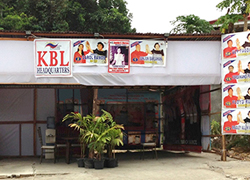Using Mobile Phones to Encourage Citizen Candidates to Run for Office
Student Researchers: Cesi Cruz and Michael Davidson
Location: Philippines
 The proposed experiment was a novel approach to lowering the barriers to entry for new political candidates in village (barangay) elections in the Philippines. Although village elections may appear to be low stakes, in practice these elections matter because mayoral candidates often use barangay officials to mobilize votes through vote buying and other means. As a result, even though barangay captains do not have the same authority and budget allocations as mayors, their elections are critical in terms of setting the scene for free and fair elections in the future.
The proposed experiment was a novel approach to lowering the barriers to entry for new political candidates in village (barangay) elections in the Philippines. Although village elections may appear to be low stakes, in practice these elections matter because mayoral candidates often use barangay officials to mobilize votes through vote buying and other means. As a result, even though barangay captains do not have the same authority and budget allocations as mayors, their elections are critical in terms of setting the scene for free and fair elections in the future.
In areas where elections are uncontested or uncompetitive, this effect can be self-perpetuating: Mayors entrench themselves in power with the help of their local machine, which then gives them the resources to ensure that their candidates for barangay positions are re-elected. In this environment, the quality of political candidates is often second in importance to political connections.
Deployed during the 2013 village elections, the project used a custom-built SMS system to collect data on who citizens believed should run for local office but were not currently planning on running, then encouraged these nominated individuals to run for office.
The experimental treatment identified potentially qualified candidates by providing citizens with information on the responsibilities and requirements of the office of barangay captain and asking them to nominate a person that they thought would be an ideal candidate. Cell phone technology allowed researchers to efficiently tell nominees when they were nominated, as well as provide them with information on filing for candidacy and running for office. In hopes of increasing sample size and the likelihood that ideal candidates are found, researchers used a social-network based initiative to encourage respondents to spread the campaign more widely by inviting their friends to text in their own nominations.
The combination of encouraging voters to make their decisions based on qualifications, making candidacy forms and materials readily available, and providing a scaleable technological infrastructure that both notifies peer-nominated individuals to run and publicizes these nominations throughout the village is expected to dramatically lower the cost of entry for would-be candidates. If successful, this would increase electoral competition in a political landscape which is frequently dominated by elites.
Using data from the first stage of collection (election results, number of candidates, voter turnout), preliminary results showed that the intervention generated substantial interest in the election and resulted in higher turnout, closer elections, and a great number of individuals choosing to run for office.
Although researchers expected that the treatment would scale very rapidly through the social network-based text referral system, in practice very few nominations were received from these secondary referrals. As a result, while the treatment was effective in terms of encouraging nominated individuals to run, more work is needed to explore better ways to encourage crowd-sourcing through social networks.
The research team planned to return to the Philippines in February 2014 to conduct interviews of the winning and losing candidates, to determine whether the intervention also had an effect on candidate quality, measured in years of education and experience in government.

 The proposed experiment was a novel approach to lowering the barriers to entry for new political candidates in village (barangay) elections in the Philippines. Although village elections may appear to be low stakes, in practice these elections matter because mayoral candidates often use barangay officials to mobilize votes through vote buying and other means. As a result, even though barangay captains do not have the same authority and budget allocations as mayors, their elections are critical in terms of setting the scene for free and fair elections in the future.
The proposed experiment was a novel approach to lowering the barriers to entry for new political candidates in village (barangay) elections in the Philippines. Although village elections may appear to be low stakes, in practice these elections matter because mayoral candidates often use barangay officials to mobilize votes through vote buying and other means. As a result, even though barangay captains do not have the same authority and budget allocations as mayors, their elections are critical in terms of setting the scene for free and fair elections in the future.